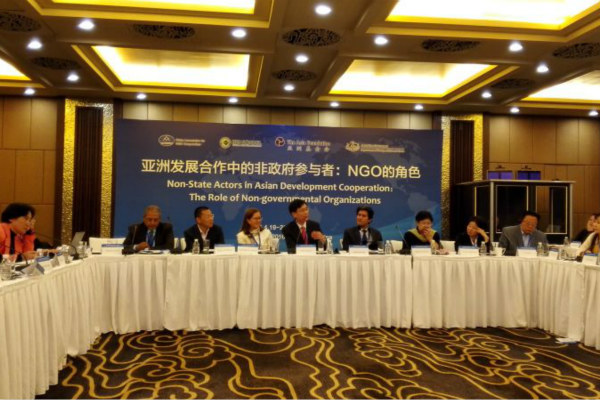Law encourages NGOs to play useful role
By LIU HUAWEN (China Daily) Updated: 2016-05-05 08:13
 |
|
Participants discuss NGO's role in Asian development cooperation during the seminar in Beijing, April 19, 2016. [Photo provided to chinadaily.com.cn] |
The first law to regulate overseas NGOs' activities in China, which the 12th Standing Committee of the National People's Congress approved last week, will take effect on Jan 1, 2017. The NPC Standing Committee reviewed the draft twice, in December 2014 and April 2015. After the second review, the draft was released to solicit public opinions, and national legislators held several meetings with overseas non-governmental organizations working in China to seek their suggestions.
Compared with the first and second drafts, we can see significant changes in the final law. As its name overseas NGO management law suggests, the law applies only to and is aimed at regulating overseas NGOs' activities in China, including foreign foundations, social organizations and think tanks, rather than schools, hospitals and academic, scientific, engineering and technological research institutions. Also, the law eases restrictions on overseas NGOs in terms of organizational capacity and staff recruitment.
By incorporating some suggestions of NGOs and the public, the law has reflected the spirit of scientific and democratic legislation.
As a developing country, China has made great economic and social achievements in recent years. Still, it faces challenges in social management, such as how to evaluate overseas NGOs' activities.
Overseas NGOs are significant players in the Chinese society today, but some legislators, government administrators and social sectors have different attitudes toward such active social players.
China has maintained a "big-government" pattern for a long time. Despite this, social organizations, especially NGOs, have played an important role in improving social structures. But many domestic NGOs lack experience given that they are latecomers in the field. In contrast, overseas NGOs' long experience and abundant funds give them a big advantage-and they do have great influence in China.

I’ve lived in China for quite a considerable time including my graduate school years, travelled and worked in a few cities and still choose my destination taking into consideration the density of smog or PM2.5 particulate matter in the region.











